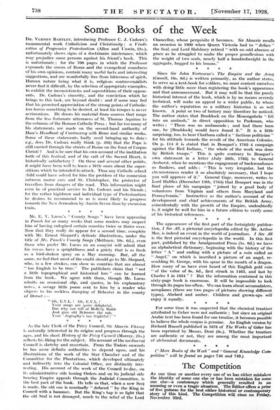Since Sir John Fortescue's The Empire and the Army (Cassell,
10s. 6d.) is written primarily, as the author states, to serve as a.text7book for soldiers, we must content ourselves with doing'little more than registering the book's appearance and that• announcement. But it may well be that the purely historical interest of the book, which is by no means severely technical, will make an appeal to a wider public, to whom the author's reputation as a military historian is so well known. A point or two of history may therefore be noticed. The author states that Braddock on the Monongahela " fell into an ambush," in direct opposition to Parkman, who writes : " There was no ambuscade ; and had there been one, he [Braddock] would have found it." It is a little surprising, too, to hear Chatham called a " factious politician " for his attitude towards the revolt of the American Colonies. On p. 114 it is stated that in Bouquet's 1763-4 campaign against the Red Indians, " the whole of the work was done by British troops." This is quite contrary to Bouquet's own statement in a letter (July 26th, 1763) to General Amherst, when he mentions the engagement of backwoodsmen as Rankers, and adds : " This is very irregular, but the circumstances render it so absolutely necessary, that I hope you will approve of it." General Gage, moreover, writes to Lord Halifax (December 13th, 1764) that Bouquet was in the final phase of his campaign " joined by a good body of volunteers from Virginia and others from Maryland and Pennsylvania." Instructive as the author's account of the development and chief achievements of the British Army, coincidentally with the growth of the Empire, undoubtedly is, it might be well for him in a future edition to verify some of his historical references.
* * * *






































 Previous page
Previous page